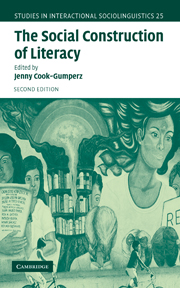Book contents
- Frontmatter
- Contents
- List of figures
- List of tables
- List of contributors
- Preface
- Acknowledgments
- 1 The social construction of literacy
- 2 Literacy and schooling: an unchanging equation?
- 3 Interactional sociolinguistics in the study of schooling
- 4 The language experience of children at home and at school
- 5 Narrative presentations: an oral preparation for literacy with first graders
- 6 Differential instruction in reading groups
- 7 Organizational constraints on reading group mobility
- 8 Developing mathematical literacy in a bilingual classroom
- 9 Spoken language strategies and reading acquisition
- 10 Speaking and writing: discourse strategies and the acquisition of literacy
- 11 The implicit discourse genres of standardized testing: what verbal analogy items require of test takers
- References
- Author index
- Subject index
2 - Literacy and schooling: an unchanging equation?
Published online by Cambridge University Press: 05 June 2012
- Frontmatter
- Contents
- List of figures
- List of tables
- List of contributors
- Preface
- Acknowledgments
- 1 The social construction of literacy
- 2 Literacy and schooling: an unchanging equation?
- 3 Interactional sociolinguistics in the study of schooling
- 4 The language experience of children at home and at school
- 5 Narrative presentations: an oral preparation for literacy with first graders
- 6 Differential instruction in reading groups
- 7 Organizational constraints on reading group mobility
- 8 Developing mathematical literacy in a bilingual classroom
- 9 Spoken language strategies and reading acquisition
- 10 Speaking and writing: discourse strategies and the acquisition of literacy
- 11 The implicit discourse genres of standardized testing: what verbal analogy items require of test takers
- References
- Author index
- Subject index
Summary
[When] we speak of a cultural revolution, we most certainly see the aspiration to extend the active process of learning, with the skills of literacy and other advanced communication, to all people rather than limited groups, as comparable in importance to the growth of democracy and the rise of scientific industry…
The long revolution, which is now at the centre of our history, is not for democracy as political system alone, nor for the equitable distribution of more products, nor for general access to the means of learning and communication. Such changes, difficult enough in themselves, derive meaning and direction, finally, from new conceptions of man and society which many have worked to describe and interpret.
(Williams 1961)The literacy–schooling equation: does it depend on a single point of view?
Since the beginning of the twentieth century, it has been unquestioningly assumed that literacy is both the purpose and product of schooling (Cicourel and Mehan 1984), and that the possession of literacy will improve the quality of life for individuals, social groups, and even society as a whole. However, as this chapter will show, the terms of this equation cannot be taken for granted. Raymond Williams, above, presents in perhaps its most idealized terms, a view of literacy as the key element that transforms human consciousness through the achievements of schooling and other social changes.
- Type
- Chapter
- Information
- The Social Construction of Literacy , pp. 19 - 49Publisher: Cambridge University PressPrint publication year: 2006
- 4
- Cited by



